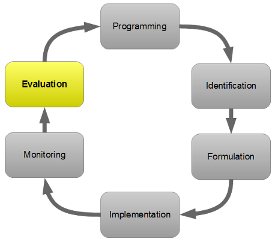Evaluation
 While monitoring is about checking whether the project is executed according to plan, evaluation is about the very reasons why you’ve developed your project in the first place. Do the results of your project effectively lead to the desired change in the lives of your beneficiaries? Was your intervention strategy effective? What are the expected and unexpected effects and impact of your project? What can you learn from the way you organised your activities? What can you learn from your project that you could use for consecutive projects and actions?
While monitoring is about checking whether the project is executed according to plan, evaluation is about the very reasons why you’ve developed your project in the first place. Do the results of your project effectively lead to the desired change in the lives of your beneficiaries? Was your intervention strategy effective? What are the expected and unexpected effects and impact of your project? What can you learn from the way you organised your activities? What can you learn from your project that you could use for consecutive projects and actions?
Evaluations can be:
- Internal evaluations: conducted by the organisation itself.
- External evaluations: conducted by an external evaluator, either an individual or a (specialised) organisation or firm. Often donors will require you to do external evaluations because they are supposedly more independent and reliable. On the other hand, external evaluators may not understand the situation as well as the local staff or partners do. Often, time and financial constraints also weigh on the quality of the evaluation and many evaluators rely heavily on the project team anyway, which beats the point of independency (also in the end it is the NGO that pays the bill).
Projects with a long duration often have mid-term or several intermediary evaluations in addition to the final evaluation. In order to do a good evaluation, the evaluators need access to information from the monitoring system. One of the most common problems is that no baseline situation has been established at the onset of the project, making it difficult to appreciate the evolution of the project and of the situation of the beneficiaries.
In addition to providing an evaluation report, most evaluators will organise a feed-back meeting of some sort. This is important for people to learn about the findings of the evaluation and the good things and bad thing about the project. This way they can take the information along for the next project.





Add new comment